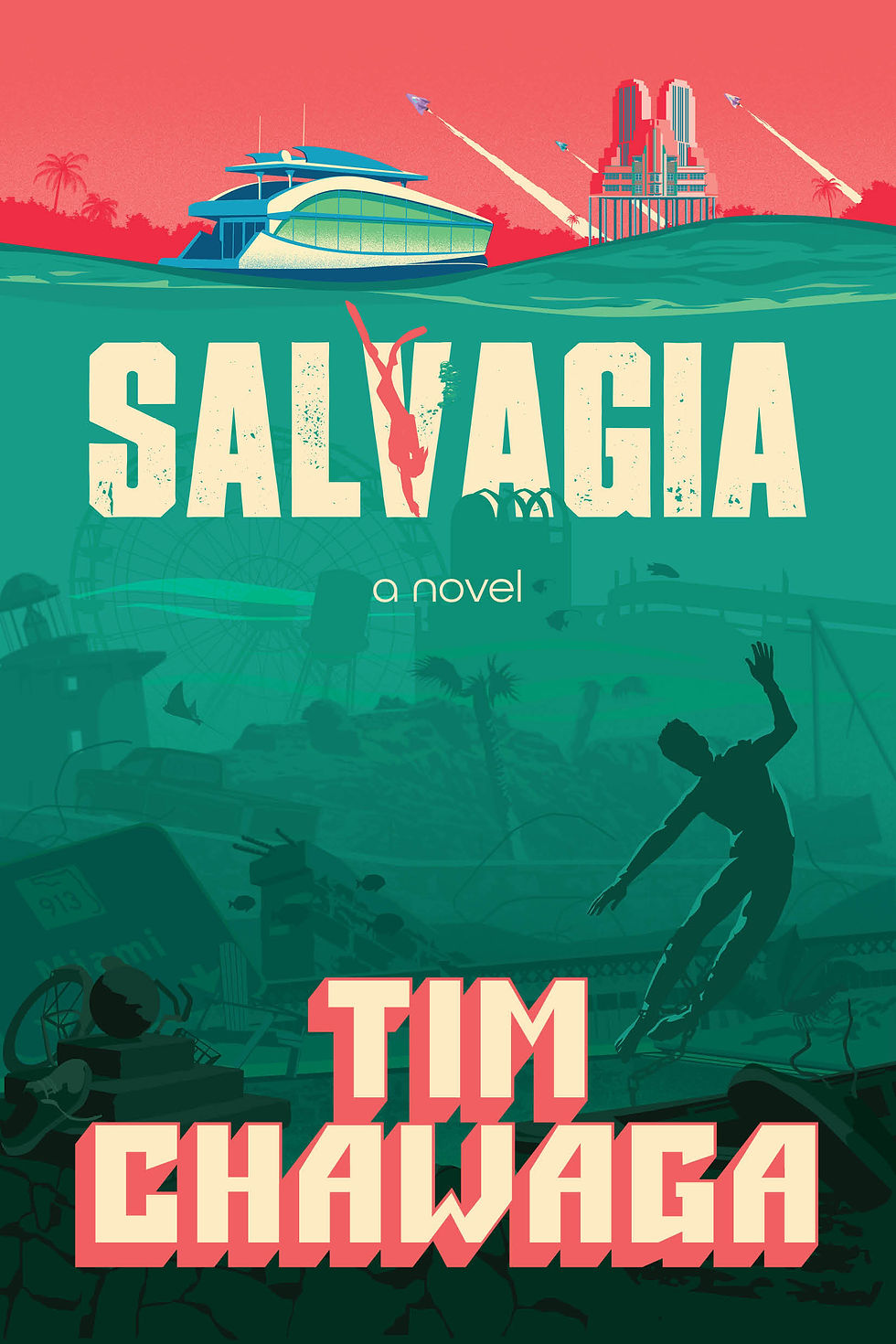When Technology is Essential, the Right to Repair Becomes the Right to Live
- Dan

- Aug 4, 2025
- 4 min read

Today on the blog, author Tim Chawaga discusses to philosophy infusing his new sci-fi novel SALVAGIA.
When Technology is Essential, the Right to Repair Becomes the Right to Live

SALVAGIA, my upcoming science fiction mystery novel, is set in a flooded South Florida on the cusp of re-settlement. Multiple groups are moving in to build and entice people to move back to a ruined coast. Some of them are running secret scams, some are building quick and cheap and dirty, and a few are trying to build something for themselves, something that lasts. Which group is which?
Their relationship to the technology they use give the best insight into their intentions.
I used to be an in-house hardware technician, repairing laptops and smartphones, spending many hours tearing down machines, learning how they worked, and developing skills that formed the basis for my vocabulary when it came to writing science fiction. At the time I was particularly struck by how every point of the supply chain of my particular company seemed to be structured to prevent customers from fixing the products that they ostensibly owned: from warranties and restrictions on independent vendors for buying parts, to repairability limitations within the actual product design itself. Often the only repair even I could make was to replace the device entirely.
By requiring specialized tools and parts to service and essentially designing devices to be disposable, companies not only discourage end-users from working on the device themselves, they also essentially prevent them from doing so at all.
Technology that is made to be disposable is obviously also inherently wasteful. But I would argue that there is an even worse consequence to rescinding a user’s ability to learn how to repair their own products.
In The Grapes of Wrath, Steinbeck writes about the efficiency of the tractor, and how its ease of use, its disposability, effectively erases its driver’s connection to the land:
“…when a horse stops work and goes into the barn there is a life and a vitality left… But when the motor of a tractor stops, it is as dead as the ore it came from.
“The heat goes out of it like the living heat that leaves a corpse. Then the corrugated iron doors are closed and the tractor man drives home to town, perhaps twenty miles away, and he need not come back for weeks or months, for the tractor is dead. And this is easy and efficient. So easy that the wonder goes out of work, so efficient that the wonder goes out of land and the working of it.”[1]
Similarly, the inevitable result of a provider-imposed superficial relationship with our technology, which has become the nexus through which most of our interactions are routed, is, must be, a diminishing of our own connection to the people at the other end of those interactions and, subsequently, our humanity.
When the device on which we see the world is disposable, it becomes easier to see the world itself, the people in it, as disposable too.

This is an idealogical statement, not a practical one. Most people today don’t really want to fix their own stuff. I myself only use my trusty iFixit-brand toolkit to occasionally unclog my Roomba. But ideals are still important, especially in the imagining of speculative futures. Ideals are what determine how that tech will be used, and whom it will serve.
The protagonists of my book, SALVAGIA, are idealogues when it comes to technology and urban planning. A century into the future, through shock doctrines and population control, governments and corporations have successfully used technology to largely erode the power of American individuals and communities and siphon them into consolidated housing. A rare opportunity to create something new is about to present itself in the most unlikely of places: South Florida, in the newly deregulated yoreshore, the area between where the shore used to be and where it is now.
In this speculative future, today’s right-to-repair movement has morphed into something closer to a paramilitary. Right-to-repair nomads travel the country, “liberating” corporate-owned IP with weapons called echidnas: hidden handles that contain modular weapons, built by fighters who learn to maintain and customize them. They are weapons that enhance the power of the individual by becoming extensions of the individual.
Another group, the Florida Aquatic Co-op, uses their own custom technology to establish a place to live on the yoreshore, outside of the existing, corporate or government-controlled alternatives.
Those who use technology to control and exploit Florida from a distance are the tractor drivers, who see tech as merely a tool, a means to an end. They control remote fleets of drones, and large construction robots to build cheap luxury high rises, with no greater ambition than to sell quickly and leave. Their intentions are clear by the speed and carelessness with which they use their tools.
Those who mean to stay must, by necessity, have a more intimate relationship with their technology, and in so doing, create a deeper connection to the yoreshore and each other, that “wonder of the working of the land.” What does it really mean to create a new, sustainable way to live in a place where no one ever has? It includes responding to the needs of the community, of living on that land for long enough to learn how to thrive alongside it.

Tim Chawaga writes plays and speculative fiction. His short fiction has been featured in "Interzone" and "Escape Pod" and his work has been performed in New York and Philadelphia at many venues that have either closed or been converted into gyms. He has a BFA in Drama from the Tisch School of the Arts, is a 2019 graduate of Clarion West and the recipient of George R.R. Martin’s Worldbuilder Scholarship.
His debut novel, "SALVAGIA", is forthcoming from Diversion Books.
Follow him on Instagram/X/BlueSky @timchawaga.
[1] Steinbeck, John. “The Grapes of Wrath.” 1939




Comments